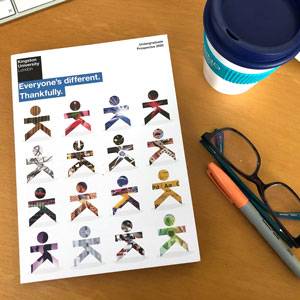Money matters
- How and when do I need to pay for my tuition fee?
- How can I bring money into the UK?
- How much cash will I need on arrival?
- How much money will I need in my first year?
- How do I set up a UK bank account?
How and when do I need to pay for my tuition fee?
Before your enrolment can be completed, you will need to have organised how you are going to be paying your tuition fee for the coming year.
We provide international students with three different payment options:
- Payment of your full fee in advance of enrolment
- Sponsorship by your employer or Government
- Payment by instalment
If you intend to pay by instalment, then before you can be fully enrolled you will need to have paid a minimum of 50% of your fee in advance and set up a recurring card payment instruction (RCP) to pay the remaining balance by instalment.
Both making payment and setting up an RCP are quick and simple processes that can be done well in advance of your enrolment date, so we recommend organising them both as soon as you are able to avoid any unnecessary delay to your enrolment.
More information and helpful videos on how to pay, set up an RCP or notify us of sponsorship, visit how to pay your fees.
How can I bring money into the UK?
You can bring money into the UK in:
- sterling notes
- travellers' cheques
- bankers' draft
- letters of credit.
You must declare cash of €10,000 or more (or the equivalent in another currency) if you take it between the UK and any non-EU country. Cash includes: notes and coins, bankers' drafts, travellers' cheques, cheques (including travellers' cheques) that are signed but not made out to a person or organisation.
You could face a penalty of up to £5,000 if you:
- fail to declare cash/travellers cheques/bank drafts/etc you are carrying; or
- provide incorrect or incomplete information.
If HMRC (customs) officials have reason to doubt the legitimacy of properly declared cash, then they have the power to seize it.
These controls will not apply to anyone:
- travelling within the EU; or
- travelling via the EU to a non-EU country – as long as the original journey started outside the EU.
For further information and contact details, visit this page on the UK government's website. You should also check if there are limits imposed on foreign currency transactions by your home country.
How much cash will I need on arrival?
You will need some sterling cash for expenses during the first week – about £250 should be enough. We do not recommend bringing or carrying larger amounts of cash with you.
If possible, make arrangements to transfer money to a UK bank account. In case there is a problem in transferring money, it is also a good idea to have a further £350 available in travellers cheques and a credit card for emergencies. You will also need money for items such as:
- food;
- local travel;
- books;
- equipment; and
- clothes and other necessities.
If you will be living in private accommodation then you may need more than this to cover any deposit or rent in advance.
How much money will I need in my first year?
You will need money to cover your tuition fees plus living costs for your first year. Tuition fees for each course can be found on the course page. We recommend checking with your University faculty as to what the course fees cover. All students classified as Overseas for fee purposes must pay 50% of the tuition fee for that academic year at, or prior to, their enrolment. Failure to make the 50% payment may cause disruption to your studies.
Living costs cover payments for accommodation, groceries, travel and other expenses. You can find a full breakdown of living cost estimates here.
How do I set up a UK bank account?
Most international students will be able to open a basic bank account. This allows you to pay money in to the account and withdraw money with a cash card. A basic bank account does not allow credit or for you to become overdrawn. Each bank has different requirements for setting up account – you may need to provide your passport, proof of study and proof of address but check with your chosen branch. Once you're an enrolled student, the Library and Student Office can produce bank letters with your UK student addresses listed.
It may be possible to set up a UK bank account in advance if you are able to open an account with a multi-national bank so that you can use ATMs in the UK – you would need to check with your bank first if this is possible.
All the main UK banks have branches in Kingston:
- Barclays Bank plc
6 Clarence Street
Kingston upon Thames
KT1 1NY
Tel: +44 (0)20 8250 6644
Bank sort code: 20-46-73
www.barclays.co.uk/personal - Lloyds TSB Bank plc
83 Clarence Street
Kingston upon Thames
KT1 1RE
Tel: +44 (0)845 0723 333
Bank sort code: 30-94-77
www.lloydstsb.com - HSBC Bank plc
54 Clarence Street
Kingston upon Thames
KT1 1NP
Tel (within UK): 08457 404 404
Tel (from abroad): +44 12 2626 1010
Bank sort code: 40-26-12
www.hsbc.co.uk - National Westminster Bank plc
Market Place
Kingston upon Thames
KT1 1JX
Tel: +44 (0)845 6101 201
or +44 (0)1634 890 882
Bank sort code: 60-60-02
www.natwest.com
Contact us
International enquiries
Tel: +44(0)20 8417 3411
Download a prospectus
 Order our latest prospectuses to find out more about studying at Kingston:
Order our latest prospectuses to find out more about studying at Kingston:
Contact us
International enquiries
Tel: +44(0)20 8417 3411